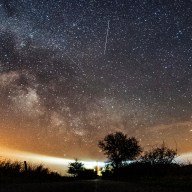getty file photo
Malcolm McDowell, star of Heroes, out now on DVD.
RISE AND FALL: While making my way through the season one box set of Heroes this weekend, I couldn’t help but speculate whether this would be as good as it would get for everybody’s favourite comic-derived ensemble cast sci-fi thriller, with the series hitting a Lost-like lull in its second season. As if echoing my thoughts, I came across an Onion A.V. Club piece showcasing the 15 biggest prime time flashes in the pan – shows that seemed to dominate the small screen for a year or so before falling from the headlines, and network schedules, just as quickly.
Top of the list are two nuggets of nostalgia – The Monkees and Batman, separated only by the cultural phenomenon that was Miami Vice. Like most lists, it’s easy to argue with some of the choices; I thought Miami Vice’s moment in the sun lasted a bit too long to call it a flash in the pan, but I didn’t actually own a TV at the time, so I guess it only seemed that stubbly beards, pastel summer weight suits and espadrilles on men were around for a long, long time. Similarly, I thought Moonlighting had a fairly healthy run, but I guess the ‘80s just felt like they were never going to end. It must have been the drugs.
The quick eclipse of the Arsenio Hall show, however, was almost impossible to notice; it seemed like one day every idiot was going “woof woof” and pumping their fist to show their slack-jawed approval, and then suddenly Hall was gone, airbrushed from the public consciousness like the white space next to Stalin where Trotsky and Kirov had once stood. Who Wants To Be A Millionaire was gone just as quickly, as was Ally McBeal, though considering how many thousands of thousands of column inches in newspapers and magazines were devoted to denunciations of Calista Flockhart’s baleful effect on popular culture and the eating habits and hemlines of young women, it felt like Ally McBeal was never a hit show as much as an assault on civilization kept on the air as part of a poisonous conspiracy.
I was completely unaware the Grace Under Fire was on television, never mind that it was a hit that crashed and burned – like film critic Pauline Kael expressing her shock that Nixon won re-election, since no one she knew voted for him, I’ve never met anyone who actually watched the show. I did, however, watch Twin Peaks, part of the herd of Gen X types who embraced the show for a few months at least – probably the only time that our demographic had any measurable influence on mainstream culture. Even at the time, though, I could see that it was going nowhere, fast, and had stopped attending “Peaks parties” long before the pitiful second season limped to a (non-)conclusion.
Because its memory is fresher, it’s easy to recall The O.C.’s rapid decline after its first season, though the inclusion of Commander-In-Chief and Studio 60 On The Sunset Strip on the list seem more dubious; neither show was ever much of a hit as much as they were causes, championed by a few TV critics and a lot more regular columnists looking to convince the poor, benighted masses to improve themselves and their viewing habits with the prime time equivalent of brown rice sushi. Just at the moment, one of the big thrills in awaiting a new TV season to start is anticipating the next flash in the pan, and the former smash hit that will wither in its shadow in the zero sum game that is prime time.
















